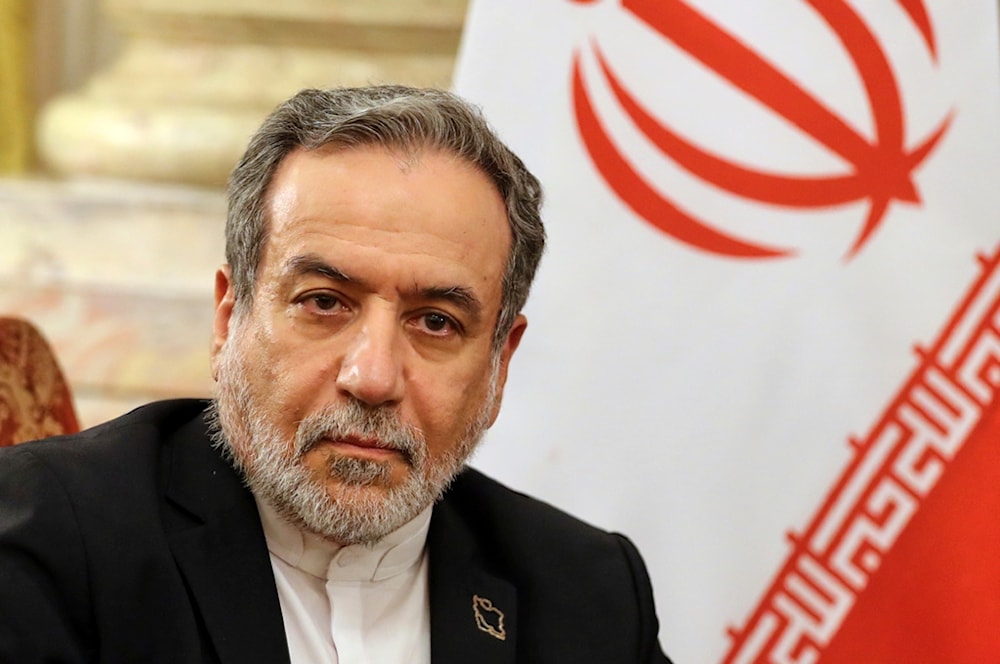Iranian FM Araghchi visits Tunisia after IAEA talks in Cairo
Iran’s foreign minister meets Tunisian leaders to discuss regional issues and strengthen bilateral ties following his stop in Cairo for nuclear talks.
-

Iranian Foreign Minister Abbas Araghchi looks on during a meeting with Director General of the International Atomic Energy Agency (IAEA) Rafael Grossi, and Egyptian Foreign Minister Badr Abdelatty, at Tahrir Palace in Cairo, Tuesday, September 9, 2025. (AP)
Iranian Foreign Minister Abbas Araghchi arrived in Tunisia on Wednesday for a round of high-level meetings, extending his North African visit following a stop in Cairo that focused on nuclear negotiations with the International Atomic Energy Agency (IAEA).
He was formally received at the airport by Tunisian Foreign Minister Mohamed Ali Nafti, ahead of scheduled talks with both Nafti and Tunisia’s president. Discussions are expected to address bilateral relations as well as broader regional and global issues.
On Tuesday, Araghchi held meetings in Cairo with Egyptian officials and IAEA Director General Rafael Grossi. The talks focused on advancing dialogue between Tehran and the agency.
In a post on X, Araghchi expressed Iran’s “deep gratitude to the Government of Egypt for its profound role in facilitating diplomacy."
Iran extends its deep gratitude to the Government of Egypt for its profound role in facilitating diplomacy.
— Seyed Abbas Araghchi (@araghchi) September 9, 2025
The framework for our collaboration with the IAEA, while hinging on our good will being reciprocated through the avoidance of unlawful and provocative steps, was made… pic.twitter.com/gAk1m1Ut6W
The Iranian foreign minister emphasized that cooperation with the IAEA depends on “avoiding unlawful and provocative steps” and requires reciprocal recognition of Iran’s goodwill.
"It was possible with the efforts of the Egyptian foreign minister and the support of President El-Sisi," Araghchi emphasized, framing Egypt’s involvement as critical to recent progress. He added that "Iranians are friends of all nations who work towards peace over conflict."
Iran, IAEA sign agreement in Cairo to resume nuclear inspections
This comes shortly after Araghchi and International Atomic Energy Agency (IAEA) Director General Rafael Grossi signed a new agreement on Tuesday to restart nuclear cooperation during a trilateral meeting in Cairo with the participation of Egyptian Foreign Minister Badr Abdel Aaty.
Speaking at a joint press conference, Grossi said that both sides had agreed on practical mechanisms to resume inspection activities inside Iran. He later wrote on X, "This is an important step in the right direction, and we thank Egyptian Foreign Minister Badr Abdel Aaty for his commitment and participation."
Araghchi reaffirmed Tehran's readiness to cooperate with the agency but stressed that such cooperation must safeguard Iran's rights and sovereignty. He also issued a warning that in the event of military aggression or the re-imposition of sanctions, "any agreement would be considered null and void."
New framework after attacks on Iranian facilities
In a similar context, Iranian Foreign Ministry spokesperson Esmail Baghaei revealed that Tehran and the agency had reached a new understanding defining the framework for cooperation and communication under current conditions, particularly following the recent attack on Iranian nuclear facilities. "The new understanding sets out a formula for cooperation between Iran and the IAEA," Baghaei explained in an interview with state television, without disclosing its details.
The deal comes at a critical juncture. The E3, France, Germany, and the United Kingdom, triggered the UN "snapback" mechanism under Resolution 2231, which could reinstate a wide range of sanctions on Tehran. Analysts suggest the Cairo agreement may be part of Iran's effort to swiftly restore monitoring, potentially blunting the political momentum behind the European push.
Mistrust rooted in past disclosures
Relations between Iran and the IAEA have been strained over the past months. In June, Tehran unveiled intelligence files revealing years of covert coordination between Grossi and Israeli officials, which Iranian authorities argued undermined the agency's neutrality.
Tehran has also accused the IAEA of compromising sensitive data that facilitated Israeli assassinations of Iranian nuclear scientists. Grossi has rejected these findings, insisting the agency is not mandated to issue political condemnations.
The mistrust deepened after the E3's activation of snapback sanctions in late August, which pushed Iran's parliament to submit an emergency bill calling for withdrawal from the Nuclear Non-Proliferation Treaty (NPT). While the measure has not yet been ratified, it marked a turning point in Tehran's posture, with lawmakers framing it as the "minimal response" to European actions.
Reset attempt amid uncertain future
Observers say that the Cairo accord is therefore seen as both a reset and a temporary truce. It represents Iran's willingness to engage constructively with the IAEA, but on the condition that its sovereignty and security are guaranteed.
At the same time, it reflects Tehran's leverage: if sanctions are reinstated or if further attacks occur, cooperation could collapse overnight.
On a related note, Egypt’s prominent role in mediating nuclear talks not only reinforces its diplomatic posture but also lands a blow to "Israel," which recently froze its record $35 billion gas export agreement with Egypt.
Read more: 'Israel', US committed 'strategic mistake': Iranian FM

 4 Min Read
4 Min Read










